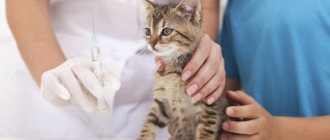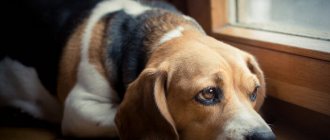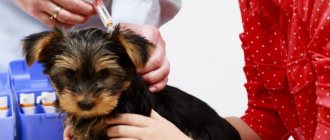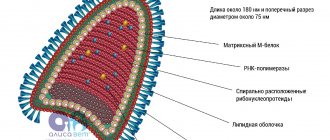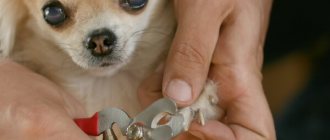The dachshund is a universal hunting dog breed, bred in Germany back in the 16th century.
Her ancestors were short hounds.
A dachshund can work in a hole and on the surface, drive with its voice, and pull wounded animals out of the water.
In addition to hunting, the dachshund has one more role: it has long become just a pet, a companion dog.
The dog is famous for its outstanding working qualities: impeccable instincts, boundless courage, ability to think logically, and act independently.
The dachshund is valued and loved for its charming appearance, courage and devotion, cheerful disposition, intelligence and intelligence.
Why get vaccinated?
Vaccinations are given to your dachshund to protect it from infectious and viral diseases.
Even if the puppy is not in contact with other animals, the infection can be brought into the house by a person. This is especially true for working dogs that come into contact with wild animals.
While the newborn puppy is under the bitch, he is protected by antibodies that enter his body along with his mother's milk .
At the fifth week, puppies are usually separated from their mother, since by this time her lactation has noticeably decreased. The puppy's baby teeth are starting to emerge and he may be trying to eat solid food.
The level of maternal antibodies in puppies drops by 6-12 weeks . It is at this time that the first vaccination is timed. The dog will develop a stable protective reaction in response to the vaccine.
Selecting a dachshund by size
The easiest way to distinguish is the standard type. These puppies are large, with strong bones and a large chest girth.
They always look at the parents first. Standard ones have a better chance of producing offspring of similar size.
Miniature dachshunds give birth to "rabbits" and "dwarfs", but there are exceptions if a large dog has the corresponding gene.
There is little difference in small dogs. Rabbit and miniature dachshunds grow at about the same rate. By 8-9 months it will become clear what type the puppy is.
They are often identified as rabbits, but the difference in chest circumference with dwarfs is up to 1 cm. To avoid confusion, official measurements are taken upon reaching 15 months.
First vaccination
Puppies are usually purchased at the age of 2.5-3 months . The responsibility for carrying out the first vaccination lies with the breeder. The puppy's veterinary passport must contain a note indicating the date of vaccination, which vaccine was used, its series and number.
IMPORTANT!
If the dog was purchased at a young age, the owner must obtain the vaccination document himself.
Be sure to consult with your veterinarian about which vaccines should be used.
Changes may be made to the generally accepted vaccination schedule, as everything depends on the puppy’s health condition. If the dog is sick, the vaccination will have to be rescheduled.
Vaccination is not carried out:
- when changing teeth (there is a danger of darkening of the enamel);
- during estrus;
- during pregnancy and breastfeeding (vaccinations will negatively affect the offspring).
Vaccines vary in their composition.
They are divided into:
- complex (polyvalent), protecting against several diseases at once;
- monovalent, acting against one specific disease.
The timing of vaccinations can be shifted, and the first vaccination is sometimes given to a puppy as early as one and a half months old . This is due to the owner’s desire to protect the baby from infections as early as possible and to be able to take him for a walk.
At such a young age, the Dutch-made Nobivak Pappy vaccine can be used. Puppies are vaccinated with it from 30 days.
Many veterinarians are against such early vaccinations, since at an early age the formation of immunity against infections will be hampered by the high content of antibodies in the puppy’s body, which it receives from its mother’s milk.
Antibody levels decline at approximately 6-12 weeks.
You cannot walk your pet before the first vaccination . You can only carry him in your arms to breathe fresh air, while avoiding contact with other animals.
After vaccinations, you also need to observe a 7-10-day quarantine, during which you will have to wait a while with walks.
Puppies after birth
Newborn dachshunds have weak and elastic ligaments and muscles. This is necessary so that they are less injured. The eyes are still closed, the ears are pressed very tightly to the head. They feed on mother's milk, and in the first days on fatty colostrum. They squeak and fidget from time to time, but once they are full and warm, they quickly calm down.
From the 10th day, the puppies' eyes open and their hearing becomes more acute. The color of the iris is usually blue and slightly cloudy. Small dachshunds are already moving more, their activity is growing every day, as is their body weight.
By 14 days they try to interact with each other. Clumsy attempts at play and biting are necessary for primary skills and reflexes. Clutching his littermate's ear with his weak jaws, the puppy understands how much force is needed to hurt.
How to prepare for vaccination
Vaccinations are only given to absolutely healthy dogs..
Two weeks before the scheduled vaccination date, the puppy is dewormed. (The first time worms are expelled is at the age of three weeks).
Without this procedure, vaccination will be useless, since worm toxins have a suppressive effect on the dog’s defense system. A note about deworming (indicating the date and name of the drug) must be placed in the veterinary passport.
It is important to observe the dosage of the anthelmintic drug.
- For puppies one month old, Drontal Junior is suitable as such a remedy.
- From 1.5 months, adult dachshunds can be given Prazinel, Prazicide or Drontal.
The dosage of the drug depends on the weight of the dog.
Before vaccination, the dachshund's temperature is measured. Normal values are considered to be from 38° to 39° for a puppy and from 38.5° to 39° for an adult dog. Temperature is measured rectally.
You cannot judge a dog’s condition by the moisture of its nose, since a dry and warm nose is not always a sign of illness . It can be like this during sleep or in the summer heat. An anxious dog can also cause a dry nose.
1-2 months
The puppy learns to interact with the outside world. Games take more time, because communication with relatives helps to put together a picture of the world. Exploring new places attracts puppies and brings them a lot of emotions.
Important: Now it is too early to separate the puppies from their mother, although she practically does not feed them. She shows how to behave in a pack and teaches useful things.
Now the puppies are very receptive to training. They form their first habits. The breeder must formulate the correct behavior very carefully, limiting access or reinforcing a positive result.
Possible side effects
Side effects after vaccination may include an allergic reaction to it.
Acute allergies can even cause anaphylactic shock, which is manifested by impaired breathing, heart rhythm, swelling, and convulsions. Choking can be fatal.
Therefore, it is better to do the vaccination in a veterinary clinic and after vaccination, stay there for at least a while, during which you carefully monitor the puppy’s condition . If problems arise, your veterinarian will be able to help quickly.
After vaccination, the pet’s condition should be under close control for two to three days. Rabies vaccination is especially difficult to tolerate.
How side effects may occur after vaccination:
- swelling at the injection site;
- loss of appetite by the puppy;
- lethargy, inappropriate behavior;
- temperature increase by 1°;
- nausea, vomiting;
- convulsions, uncoordinated movements;
- salivation;
- uncontrollability of natural urges.
- irregular heart rhythm, difficulty breathing.
If such signs appear one-time and disappear on the second or third day, a visit to the veterinarian is not necessary. The puppy will need enough home care and attention. The pet's condition after vaccination should return to normal within a week.
If after vaccination the dog:
- the temperature has changed in any direction by more than one degree;
- fever;
- severe vomiting;
- epileptic seizures;
- loss of appetite lasting more than a day;
- swelling of the muzzle and limbs;
- inflammatory process at the injection site;
- depression - it is imperative to seek veterinary help.
Care and training
Before 3-4 months, it is not advisable to completely wash puppies unless there is a good reason. But they are accustomed to water procedures early by dipping their paws. The same applies to combing, especially for long-haired dachshunds.
Food is given often. In the first months, 5-6 times a day, by 6 months the number of feedings is reduced to 3 times, and by 9 months to 2 times. The diet is based on cottage cheese, kefir, lean meat, vegetables and porridge made from buckwheat and rice.
Training is needed from 3-4 months. They learn the first commands, paying great attention to obedience. The first classes are carried out at home, then outside on a leash. If the dachshund obeys and follows the given commands the first time, then it will practice them in free flight.
What vaccinations are given to an adult dog?
Adult Dachshunds must be vaccinated against rabies annually. This should be done as part of a complex vaccination. Rabies is not vaccinated separately. This is a very painful vaccination and is difficult to tolerate.
In addition to rabies, adult dogs are vaccinated annually against:
- Chumki
- Leptospirosis.
NOTE!
Vaccinations after six months (which include rabies) need to be done only at a state veterinary hospital if the dog is planning to travel abroad.
Certificates from nurseries or private veterinary clinics for customs control are invalid.
There is an opinion that dachshunds have naturally high immunity, so it is not necessary to vaccinate them.
But leaving your dog unvaccinated means putting it at risk of contracting dangerous diseases, not all of which are curable. Without mandatory vaccinations, a pet will not be able to participate in exhibitions or accompany its owner on travel.
5-6 months
Formation and puberty occur faster in small dogs. This age is dangerous because the body is already large, and the psyche is not strong. Fears received now or a little earlier affect behavior, because the dog’s memory controls its behavior. Unpleasant conditioned reflexes need to be corrected.
Walks increase in duration, but control over the pet only increases. An increase in testosterone levels threatens violence in males; the behavior of females is a little calmer at these moments.
The dog easily breaks off the leash, wanting to play with his relatives, meet people, or catch up with a flying plastic bag.
Dachshunds finally mature at 16 months or a little earlier.
How to care for a dachshund puppy in a private home?
Proper care for a taxi driver living in a private house must be done in the same way as for an apartment pet. The only thing is that keeping and walking a dachshund in the yard will leave noticeable traces in the form of the ubiquitous excavated holes. And since taxi drivers are natural hunters, they will catch small animals.
What does a dachshund need in the house?
Taxi drivers living in private houses require exactly the same things as those living in apartments:
- House.
- Tray.
- Bowls.
- Leash and collar.
- Toys.
- Dental stick.
- Warm clothes.
Types of vaccines
The most popular vaccines used in Russia are divided into 4 types:
- Inactivated serums.
- Attenuated vaccines.
- Anatoxins.
- Chemicals.
The differences between the above vaccinations are based on the composition of virus strains and the principle of immunity formation in the body.
Also, modern sera are divided into single vaccines and complex ones; they differ in the possibility of developing immunity from one disease or several, respectively.
Complex serums are very popular; they are more convenient to use (there is no need to make several injections) and cheaper.
The most common drugs used at the moment:
- Nobivak. There are several types, both mono and complex. Manufactured in the Netherlands. This drug is safe even for puppy dogs, but is used only when absolutely necessary, after consultation with a veterinarian. The overall market rating is 4 out of 5, the price of the drug varies depending on the complex of diseases from 100 to 800 rubles .
- Multikan. The complex preparation of domestic production is divided into 3 types depending on the number of diseases included. It is highly efficient and has good consumer reviews. The price of the drug is in the range of 200 – 600 rubles .
- Vanguard. Also a complex vaccine made in the USA. Very effective, but protection against rabies is not included in the composition; it must be installed separately. The average cost of the drug is 300 - 500 rubles .
- Biocan. It has a wide range of protection, but reviews from owners are not all good; enteritis occurs in vaccinated dogs. Manufacturer: Czech Republic, prices in veterinary pharmacies range from 300 to 600 rubles.
Despite the different types of drugs, they are administered according to the same scheme. The serum is injected subcutaneously into the withers or intramuscularly.
Features of keeping a dachshund in an apartment
Caring for your favorite dachshund at home is not as difficult as new owners think. This is a small breed, so it is best suited for living in an apartment.
Keeping a dachshund in a city apartment has its own subtleties:
- Taxi drivers must not jump from anywhere, even from the sofa, otherwise they will be injured;
- dogs love to chew on anything that is in a bad position, so you need to remove wires, wobbly objects and anything that can be bitten out of sight;
- Dachshunds can eat all the plants in the apartment, so it is better to remove poisonous vegetation from the house.
